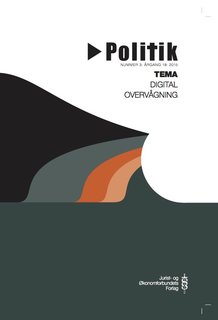Den digitale dobbeltgænger
DOI:
https://doi.org/10.7146/politik.v18i3.27617Resumé
Today, many practices related to security, safety, welfare and even entertainment are based on gathering and using personal data. is article argues that this kind of surveillance, often labeled dataveillance, entails the production of ‘data doubles’, which act as proxies for the individual. Using the concepts of surveillant assem- blages and oligoptica the article interprets data doubles as 1) produced by networks, 2) fragile, and 3) limited in scope. is line of thought implicates empirical interest in the production and purpose of speci c and het- erogeneous data doubles rather than assuming an a priori critical attitude to the nature and function of these.
Downloads
Publiceret
Citation/Eksport
Nummer
Sektion
Licens
Forfattere, der publicerer deres værker via dette tidsskrift, accepterer følgende vilkår:
- Forfattere bevarer deres ophavsret og giver tidsskriftet ret til første publicering, samtidigt med at værket er omfattet af en Creative Commons Attribution-licens, der giver andre ret til at dele værket med en anerkendelse af værkets forfatter og første publicering i nærværende tidsskrift.
- Forfattere kan indgå flere separate kontraktlige aftaler om ikke-eksklusiv distribution af tidsskriftets publicerede version af værket (f.eks. sende det til et institutionslager eller udgive det i en bog), med en anerkendelse af værkets første publicering i nærværende tidsskrift.
- Forfattere har ret til og opfordres til at publicere deres værker online (f.eks. i institutionslagre eller på deres websted) forud for og under manuskriptprocessen, da dette kan føre til produktive udvekslinger, samt tidligere og større citater fra publicerede værker (se The Effect of Open Access).

